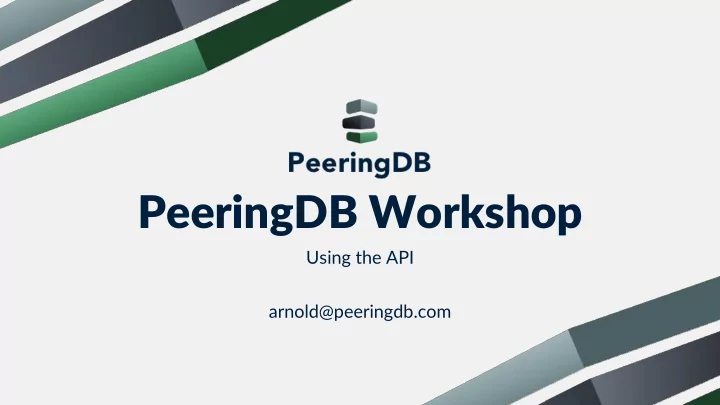

PeeringDB Workshop Using the API arnold@peeringdb.com
Agenda • Introduction • JSON • HTML Operations • Record Types • Basic Records • Derived Records • The jq JSON Postprocessor • Examples 2019-02-27 Apricot 2019, Daejeon, South Korea 2
Introduction • Why API (Application Programming Interface)? • The GUI is nice for human beings • Automation needs structured data • Makes it easy to integrate PeeringDB in your environment 2019-02-27 Apricot 2019, Daejeon, South Korea 3
JSON • Open standard file format • Short for JavaScript Object Notation • Filenames use the extension .json • Language independent data format • Basic data types • Number • String • Boolean • Array • Object • null 2019-02-27 Apricot 2019, Daejeon, South Korea 4
Basics • In general https://peeringdb.com/api/OBJ • OBJ is case insensitive • So called endpoint: /api/OBJ • Output always fits in one object • Meta is optional • Data always an array 2019-02-27 Apricot 2019, Daejeon, South Korea 5
Authentication • Authentication via basic HTTP authorization • Guest access does not need any authentication • Examples • curl -sG https://username:password@peeringdb.com/api/poc • curl -u username:password https://peeringdb.com/api/poc • Put credentials in .netrc • machine peeringdb.com login username password password • Recap: only access to contact information may be restricted • Endpoint /api/poc 2019-02-27 Apricot 2019, Daejeon, South Korea 6
Operations • All HTML operations are supported • GET • Requests a representation of the specified resource • POST • Used to submit an entity to the specified resource • PUT • Replaces all current representations of the target resource with the request payload • DELETE • Deletes the specified resource 2019-02-27 Apricot 2019, Daejeon, South Korea 7
GET • GET • Multiple objects • Endpoint /api/OBJ • Single object • Endpoint /api/OBJ/id 2019-02-27 Apricot 2019, Daejeon, South Korea 8
Optional URL parameters for GET • limit • Integer value • Limits to n rows in the result set • skip • Integer value • Skips n rows in the result set • depth • Integer value • Nested sets will be loaded • See Nesting slide 2019-02-27 Apricot 2019, Daejeon, South Korea 9
Optional URL parameters for GET • fields • String value • comma separated list of field names • only matching fields will be returned in the data • since • Integer value • Retrieve all objects updated since specified time • Unix timestamp in seconds • fieldname • Integer or string value • Queries for fields with matching value 2019-02-27 Apricot 2019, Daejeon, South Korea 10
Nested Data / Depth • Of type OBJ_set • Example: net_set will hold network objects • Depth (for endpoint /api/OBJ) • 0: don't expand anything (default) • 1: expand all first level sets to ids • 2: expand all first level sets to objects • Depth (for endpoint /api/OBJ/id) • 0: don’t exand anything (default) • 1-4: expand all sets and related objects according to level of depth specified 2019-02-27 Apricot 2019, Daejeon, South Korea 11
Query modifiers • numeric fields • __lt: less than • __lte: less than equal • __gt: greater than • __gte: greater than equal • __in: value inside set of values (comma separated) • string fields • __contains: field value contains this value • __startswith: field value starts with this value • __in: value inside set of values (comma separated) 2019-02-27 Apricot 2019, Daejeon, South Korea 12
POST • Used to create an object • Endpoint /api/OBJ • Required parameters • Depending on OBJ File 22106.json • For org you need the name • For fac , ix , net you need the org_id • for fac you need the name • For ix you need the name • For net you need the asn • Example • curl -sn -X POST -H "Content-Type: application/json" -d @22106.json \ https://tutorial.peeringdb.com/api/org 2019-02-27 Apricot 2019, Daejeon, South Korea 13
PUT • Used to edit object • Endpoint /api/OBJ/id • Updates data in OBJ/id File 22106.json • Example • curl -sn -X PUT -H "Content-Type: application/json" -d @22106.json \ https://tutorial.peeringdb.com/api/org/22114 • Operation of PUT is idempotent 2019-02-27 Apricot 2019, Daejeon, South Korea 14
DELETE • Used to delete objects • Endpoint /api/OBJ/id • Example • curl -sn -X DELETE -H "Content-Type: application/json“ \ https://tutorial.peeringdb.com/api/org/22114 2019-02-27 Apricot 2019, Daejeon, South Korea 15
Object Types • Basic Objects • org, fac, ix, net, poc • Derived Objects • ixlan, ixpfx, netixlan, netfac 2019-02-27 Apricot 2019, Daejeon, South Korea 16
Basic Objects • org • Root object for fac, ix, net • Holds information about organisation • fac • Describes a facility / colocation record • More useful information are in derived records netfac • ix • Describes an Internet Exchange • More useful information are in derived records ixlan, ixpfx and netixlan • net • Describes a network / ASN • More useful information are in netfac and netixlan • poc • Describes various role accounts (point of contact) • Currently only for net objects 2019-02-27 Apricot 2019, Daejeon, South Korea 17
Derived Objects • ixlan • Describes the LAN of an IX • One IX may have multiple ixlan • May go away with PeeringDB 3.0 • ixpfx • Describes the IP range (IPv4 and IPv6) for an ixlan • One ixlan may have multiple ixpfx • netixlan • Describes the presence of a network at an IX • netfac • Describes the presence of a network at a facility 2019-02-27 Apricot 2019, Daejeon, South Korea 18
Recommend
More recommend